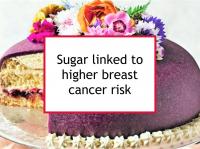Frequent consumption of table sugar (sucrose), sugary sweets, and high-sugar desserts is associated with increased risk of breast cancer and reduced survival. This is true not only of women with metabolic syndrome or type 2 diabetes; even lean women are more likely to develop breast cancer if consuming a significant amount of sugar.
Now a large prospective study has reported that relatively high sugar intake is a risk factor for cancer overall and breast cancer in particular. The results held after adjusting for any weight gain during the six-year study period.
Sugar and breast cancer
The idea that breast cancer is "fed by sugar" is at best a partial explanation for the association between sugar consumption and breast cancer risk. All of our cells require energy in the form of glucose to function. Cancer cells typically consume glucose at a much higher rate than normal cells. However, cancer cells will obtain glucose from a variety of foods in the diet. Consuming sugars such as sucrose and fructose appears to have specific breast cancer-promoting effects, such as increasing estrogen and insulin production, in addition to potentially serving as an energy source for cancer cells.
High sugar intake appears to increase the risk of all types of breast cancer. One study reported that sugar promoted tumor development in three mouse models of breast cancer, including HER2 overexpressing (HER2+), metastatic (stage IV), and triple negative (ER-/PR-/HER2-) disease. Sweetened soda consumption increases the level of circulating estrogen, a known risk factor for breast cancer. Women who consumed at least one cup (8 oz.) of sweetened soda per day were found to have 16.3% higher estradiol (E2) concentrations compared to women who consumed less sweetened soda after adjusting for age, body mass index (BMI), dietary factors, ethnicity, and level of physical activity in one study. High consumption of sugar-sweetened beverage or foods has also been linked to increased breast density, another breast cancer risk factor.
High sugar consumption appears to increase the risk of breast cancer at all ages. High sugar intake during childhood is associated with early puberty and increased risk of breast cancer in adulthood. Several Italian and U.S. studies have found links between adult consumption of sweet beverages, added sugars, and desserts and heightened risk. A large prospective Icelandic study reported that older women with high consumption of cookies, cakes, candy, sweet juice and other high-sugar foods and beverages were also at increased risk of breast cancer.
Latest research finds sugar increases breast cancer risk
The large, prospective study referenced above was designed to investigate the associations between total and added sugar intake and cancer risk. The study included adult 101,279 participants (median age 40.8 years) in the French NutriNet-Santé prospective cohort (enrolled 2009 to 2019). Participants were followed for a median of 5.9 years. Sugar intake was determined using repeated validated 24-hour dietary records. The questionnaires were designed to assess usual consumption for more than 3,500 food and beverage items. Participants were divided in four groups (quartiles) based on lowest to highest levels of sugar intake. Analyses were adjusted for known cancer risk factors.
A total of 2,503 cases of cancer (including 783 breast cancer) were diagnosed during the follow-up period. Total sugar intake was found to be associated with higher overall cancer risk: participants in the highest quartile of consumption were 17% more likely to develop cancer than those in the lowest quartile. Further analysis found significant associations with cancer risk for added sugars, free sugars, sucrose, sugars from milk-based desserts, dairy products, and sugary drinks. Breast cancer risk was especially high: women in the highest quartile of consumption were 51% more likely to develop breast cancer than those in the lowest quartile. The results persisted after adjusting for any weight gain during the follow-up period. The authors conclude that reducing sugar intake may represent an opportunity for cancer prevention, breast cancer in particular.
Please see our article on glycemic load and our page on sugar for more information.
